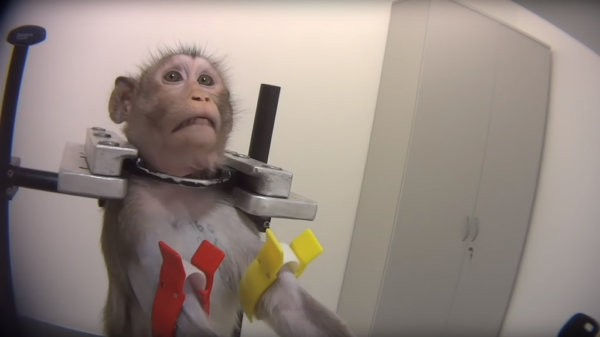by Jonathan Latham, PhD (Please note: this article contains disturbing content)
The case of an animal rights activist who infiltrated an independent German chemical testing laboratory has triggered the discovery of an apparently extensive chemical testing fraud.
LPT Hamburg, with around 175 employees, is one of the largest contract laboratories in Germany. It is a family owned private company. It prepares regulatory studies on behalf of the pharmaceutical and pesticide industries and has three locations: Mienenbüttel in Lower Saxony, Neugraben in Hamburg and Wankendorf in Schleswig-Holstein.
An initial case of fraud was reported in 2019 by the German magazine FAKT, which worked with the animal rights organisations Cruelty Free International and SOKO-Tierschutz to expose the findings of the undercover employee. The disturbing irregularities they discovered included the death and replacement of animals without this being reported to authorities.

This distressing video from FAKT summarises the findings and was filmed at LPT.
But since the initial investigation by FAKT five former employees of LPT Hamburg have come forward with new information.
In interviews broadcast by FAKT in November of 2019, one employee told the magazine of testing fraud:
“I not only experienced it, I did it myself. I forged documents; our studies. If the results did not meet expectations, I was asked to improve them. The data that did not fit in were marked so that I could enter it on the blank protocol the new values that were given to me. The new report was also marked with the old date and my signature…”
A second employee who came forward told FAKT:
“These animals, especially in the high-dose group, actually had completely open skin – so it was the raw meat that was visible, miserable really miserable. […] In fact, one animal died in the high-dose group and was replaced by another animal. Here, too, the tattoo number, which is in the chest area of the animal, was cut out of the dead animal and added to the organs of the replaced animal after the end of the study. So that it looks as if this animal had not died at all.“
A third told FAKT that they had observed repeated falsification of studies and that they later reported this to the German authorities:
“So, a few months after I left LPT, I contacted the responsible authorities here. And had an appointment. And in this appointment we discussed the LPT issue together. It was also about manipulation of data and of course about the fact that studies were so strongly influenced that it was not compatible with my conscience.”
However, the employee never heard from the authority again.
These revelations have major implications for public and environmental health. They undermine the idea that testing by commercial laboratories is independent of the chemical industry, thereby challenging the validity of the entire system of toxicological evaluation of chemicals like pesticides and pharmaceuticals. These allegations echo previous cases of chemical testing fraud, such as the IBT scandal of the late 1970s, including the more recent realisation that this fraud was covered up by the overseeing government agencies, such as the US EPA.
A further implication, according to a new report on the LPT case carried out by PAN Germany, Corporate Europe Observatory and Global 2000 of Austria, is that many of the studies supporting the EU’s reapproval of glyphosate came from LPT.
According to the EU’s reassessment of glyphosate, all industry-derived studies on genotoxicity concluded that glyphosate was safe, or nearly so. On the other hand, the majority of peer-reviewed studies concluded it was not. In its reauthorization process the EU agency which evaluated glyphosate concluded that the industry studies submitted were reliable and the peer-reviewed studies were “not reliable”. This designation cleared the way for reauthorization. At least 21 studies submitted by Monsanto supporting glyphosate’s reauthorization came from LPT.
The primary given reason why peer reviewed studies are deemed inadmissible by regulators is that they do not have the technical certification known as Good Laboratory Practice (GLP). GLP follows OECD guidelines which were adopted by the EU in 2004.
GLP has long been criticised as failing to guarantee high quality research (Elliott et al. 2016, Myers et al. 2009, Wagner and Michaels 2004). It has always been defended, however, on the basis that it prevented exactly this kind of fraud.
<h4>References</h4>
Elliott, Kevin C. Standardized study designs, value judgments, and financial conflicts of interest in research. Perspectives on Science 24.5 (2016): 529-551.
Myers, John Peterson, et al. Why public health agencies cannot depend on good laboratory practices as a criterion for selecting data: the case of bisphenol A. Environmental health perspectives 117.3 (2009): 309-315.
Wagner, Wendy, and David Michaels. Equal treatment for regulatory science: extending the controls governing the quality of public research to private research. American journal of law & medicine 30.2-3 (2004): 119-154.
If this article was useful to you please consider sharing it with your networks.



Creative Class™ liberals will ignore this, as disturbing. Then vote for corrupt reactionaries, solely to perpetuate this status quo? In short, we can’t handle the truth. Energy In Depth, Genetic Literacy Project, etc. has generations of research into selling us doubt, lies and obfuscation on smoking, asbestos, gavaging radium-flavored fracking brine to our kids & dousing our crops with de-scaling poisons to facilitate harvest. Specious obliviousness is the last, most prized vestage of their entitled grandiosity, rendering fact as “sowing discord.”
Philo Beddoah, I sadly agree with what you’ve written.
As difficult and depressing as it was to read this article, I can’t “un-know” what I’ve learned through sources like Independent Science News.
I just wish I could do more to overcome the deception and the continuing evil it causes. Hopefully, the exposure, like a pebble thrown in the lake, will gradually disturb the lake and resettle it in a better way.
Thanks Independent Science News.
susan you can do more. we each can. strap on a vest and walk into the nearest bank. at this point this is the only possible solution.